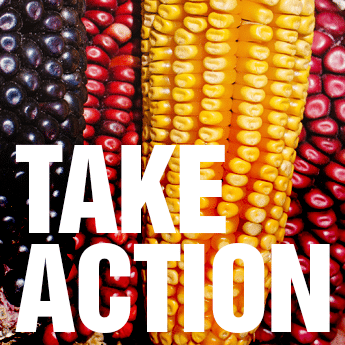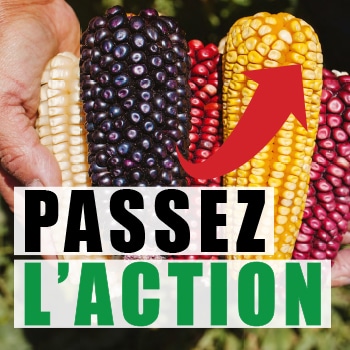August, 2016: Drift from dicamba is damaging crops in Canada and the US.
The US Environmental Protection Agency reported it has an “unusually high number of reports of crop damage that appear related to misuse of herbicides containing the active ingredient dicamba”. The EPA has not yet approved Monsanto’s new dicamba formula which is designed to reduce drift. Read the story here.
In Canada: “We’re not just going to be spraying glyphosate on soybeans any more. We need two modes of action and we have to keep the drift from reaching other crops.” Read the story here.
June 23, 2015: The World Health Organization’s International Agency for Research on Cancer (IARC) has classified the herbicide 2,4-D as a “2B – possible” carcinogen.
Glyphosate and glyphosate-tolerant crops are reaching the end of their life cycle due to the emergence of glyphosate-resistant weeds. With no new herbicides on the horizon, the seed and pesticide industry is encouraging farmers to use other herbicides and to adopt new GM crops that are tolerant to the older herbicides 2,4-D and dicamba (often these are stacked with tolerance to multiple herbicides).
Canada was the first country in the world, in 2012, to approve 2,4-D-tolerant crops and a dicamba-tolerant soy. Health Canada and the Canadian Food Inspection Agency have approved genetically engineered (genetically modified or GM) 2,4-D tolerant crops manufactured by Dow AgroSciences. Dow has genetically engineered “Enlist” corn and soy to tolerate its “Enlist Duo” herbicide that combines glyphosate and 2,4-D choline. The Enlist corn seeds will also be stacked with Monsanto’s Roundup Ready Corn 2 and SmartStax:
- Corn DAS-40278-9 – with increased tolerance to 2,4-D
- Soybean DAS-68416-4 – tolerant to 2,4-D and glufosinate
- Soybeans DAS-44406-6 – tolerant to glufosinate, 2,4-D and glyphosate tolerance
A dicamba-tolerant soybean from Monsanto has also been approved.
Pending regulatory approval in China, the 2,4-D-tolerant corn has only been in limited production in Canada and the US. It is currently restricted to on-farm use for livestock feed. Monsanto’s dicamba-tolerant soy is not yet on the market.
There are already 16 species of 2,4-D resistant weeds around the world (five in the US and two in Canada) and six species resistant to dicamba, (two in the US and two in Canada). Charles Benbrook has predicted that widespread use of 2,4-D resistant crops in the US could increase herbicide use by another 50% (Benbrook, C., 2012. Impacts of genetically engineered crops on pesticide use in the U.S. – the first sixteen years. Environmental Sciences Europe, 24.)
For more details, check CBAN’s GMO Inquiry report “Are GM Crops Better for the Environment?”
Click here for background on 2,4-D crops, 2,4-D toxicity and the problem of herbicide-resistant weeds.
Civil society groups Équiterre, Nature Québec, the Canadian Association of Physicians for the Environment, Prevent Cancer Now, the Canadian Biotechnology Action Network, and Vigilance OGM denounced regulatory approval of Canada’s first corn and soy crop plants genetically engineered (also called genetically modified or GM) to tolerate doses of the herbicide 2,4-D. The groups say that the new GM crops, developed Dow AgroSciences, will lead to increased herbicide use, with more toxic pesticides in the environment and our food. See the Press Release, November 19, 2012: GM 2,4-D-Tolerant Crops set to Accelerate Pesticide Use: Groups denounce government approvals as reckless
Monsanto’s Dicamba-Tolerant Soy
The dicamba-tolerant soy from Monsanto is Roundup Ready 2 Xtend, because it will also be glyphosate tolerant – here is what Monsanto currently says about the status of the market status of this product:
Roundup Ready 2 Xtend™ soybeans have received regulatory approval in Canada, regulatory approval in other key export markets is still pending. Commercialization is dependent on multiple factors, including successful conclusion of the regulatory process in key export markets and the registration of new soybean varieties in Canada. The information presented herein is provided for educational purposes only, and is not and shall not be construed as an offer to sell until all necessary regulatory obligations are met.
Roundup Xtend™ herbicide with Vaporgrip™ Technology and XtendiMax™ herbicide with VaporGrip™ Technology have not completed the registration process under the Pest Control Products Act and thus cannot be manufactured, imported, distributed or used for commercial purposes in Canada at this time. Commercialization is dependent on multiple factors, including successful conclusion of the regulatory process. (Accessed April 22 2015: https://www.genuitytraits.ca/en/soybeans/roundup-ready-xtend-crop-system/roundup-ready-2-xtend-soybeans/)






